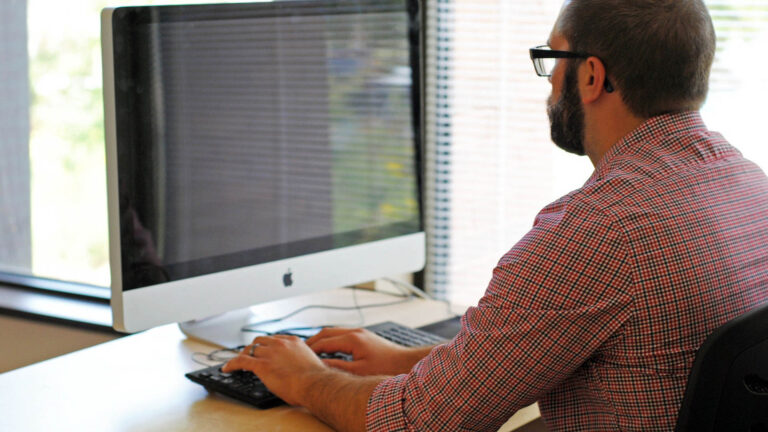As a medical technologist, your career path revolves around diagnostic testing, laboratory analysis, and generating insights to improve patient care. But before you can make your mark on the industry, you need to stand out from the rest. And what better way to do that than with a well-crafted resume?
In today’s job market, a resume is not just a list of accomplishments or duties. It’s an opportunity to showcase your expertise and prove to potential employers that you are the best candidate for the job. A poorly constructed resume can undermine your experience and education, despite your wealth of knowledge and skill.
Moreover, the healthcare industry is evolving at an unprecedented rate. Employers are looking for candidates who can adapt and thrive in this fast-paced environment. Your resume needs to reflect that agility and innovation, while also showcasing your ability to maintain accuracy and attention to detail in all situations.
So, what should your medical technologist resume look like? How can you highlight your key strengths and achievements in a way that resonates with prospective employers? And what common mistakes should you avoid? This article will provide samples and pro tips to help you craft a well-rounded and impactful resume that translates into successful career opportunities.
Understanding the Role of a Medical Technologist
Medical Technologists play a crucial role in healthcare organizations, as they are responsible for analyzing bodily fluids and tissues to aid in diagnosing diseases and illnesses. Here is a detailed breakdown of the duties and responsibilities of a Medical Technologist:
1. Conducting laboratory tests: Medical Technologists run a variety of lab tests, including blood tests, urine tests, and tissue samples. They must ensure that all samples are properly labeled, recorded, and analyzed.


2. Operating complex laboratory equipment: Medical Technologists are skilled in operating complex machinery and equipment, such as microscopes and analyzers. They must also perform maintenance, calibration, and troubleshooting on these machines.
3. Analyzing test results: Once a test is completed, Medical Technologists must analyze the results and use critical thinking skills to interpret any abnormalities or irregularities. They must also communicate these findings to the appropriate parties.
4. Maintaining accurate records: Medical Technologists must keep accurate and detailed records of all laboratory procedures, including test results, equipment maintenance, and supplies used.
5. Maintaining laboratory standards: Medical Technologists must ensure that all laboratory equipment, materials, and procedures are up-to-date and in compliance with industry standards, as well as health and safety regulations.
In addition to these duties and responsibilities, Medical Technologists must possess a variety of key skills and qualifications to excel in their role. Here are some of the most important:
1. Strong analytical and critical thinking skills: Medical Technologists must be able to analyze complex data and interpret the results in a clear and concise manner.
2. Attention to detail: Medical Technologists must be highly attentive to detail, as errors in data or analysis could have severe consequences for patient care.
3. Strong computer and technical skills: Medical Technologists must be proficient in using various computer and lab equipment systems.
4. Excellent communication skills: Medical Technologists must be able to communicate effectively with other healthcare professionals and patients, and be able to convey complex information in an easy-to-understand manner.
5. Bachelor’s degree in Medical Laboratory Science or related field: This degree provides Medical Technologists with the necessary knowledge and training to excel in their role.
The role of a Medical Technologist is a highly specialized and critical one in the healthcare field. By possessing the key skills and qualifications outlined above, Medical Technologists can provide patients with accurate and timely diagnoses, and help improve overall health outcomes.
Formatting a Medical Technologist Resume
A well-formatted resume is essential for any Medical Technologist who wants to stand out from the competition. When formatting your resume, keep in mind that it should be clear, concise, and easy to read. Here are some tips on how to choose the right format for your Medical Technologist resume:


Tips on choosing the right format for your Medical Technologist resume
Choose a format that suits your skills and experience. There are several formats to choose from, including chronological, functional, and hybrid. The chronological format highlights your work experience, while the functional format focuses on your skills and achievements. The hybrid format combines both formats.
Make sure your resume is easy to read. Use a standard font, such as Arial, Calibri, or Times New Roman, and keep the font size between 10 and 12 points. Use bullet points to highlight your achievements and responsibilities.
Tailor your resume to the job you’re applying for. Make sure your resume matches the job description and highlights your relevant skills and experience.
Standard sections to include in your Medical Technologist resume
When creating a Medical Technologist resume, there are several standard sections you should include:
Contact Information: This should include your full name, address, phone number, and email address.
Professional Summary: This should be a brief statement that highlights your skills and experience.
Work Experience: This should list your previous work experience, including job titles, dates of employment, and key responsibilities.
Education: This should list your degrees and certifications, including the name of the school, degree, and graduation date.
Skills: This should list any relevant skills you have, such as proficiency in a foreign language or experience with a particular technology.
Recommended resume length
Your Medical Technologist resume should be one to two pages long. Make sure to include all relevant information, but avoid including unnecessary details. Remember, your resume is your first impression, so make sure it’s clear, concise, and tailored to the job you’re applying for.
Writing Your Medical Technologist Resume
When it comes to writing a medical technologist resume, there are several key components that you need to include to make yourself stand out from the crowd.
Crafting a compelling summary statement
One of the most important aspects of your resume is the summary statement, which should be a brief but compelling introduction to who you are and what you can offer an employer. This statement should highlight your unique skills, experience, and qualifications, and should be tailored specifically to the job you are applying for.
Highlighting your relevant work experience
Next, you should focus on highlighting your relevant work experience, including any internships or clinical rotations you may have completed. Be sure to include specific details about your duties and responsibilities, and quantify your achievements wherever possible to give potential employers a clear understanding of your abilities.
Showcasing your education and certifications
As a medical technologist, education and certifications are essential components of your resume. Be sure to include information about your degree(s) and any relevant certifications you may have, including licensure or registration with professional organizations.
Demonstrating your technical skills and software proficiency
Finally, you should demonstrate your technical skills and software proficiency by including a section that highlights your experience with laboratory equipment, software programs, and other technical tools. Be specific about the tools and technologies you have used in previous positions, and provide details about your level of proficiency with each.
Crafting a strong medical technologist resume requires careful attention to detail, a clear understanding of what potential employers are looking for, and a willingness to showcase your unique experience, education, and qualifications. Use these tips and pro tips to create a compelling resume that will help you stand out from the crowd and land the job you want.
Examples of Medical Technologist Resume Formats
In this section, we will dive into some detailed examples of resume formats that are commonly used by Medical Technologists. Along with these examples, we will also provide an analysis of their strengths and weaknesses.
1. Chronological Resume Format
The most common and widely used format is the chronological resume format. In this format, the candidate’s experience is listed chronologically, starting with the most recent job first.
Strengths:
- Easy to read and understand for employers
- Highlights the candidate’s career progression and growth
- Emphasizes recent experience, which is critical for healthcare positions
- Gives employers an idea of how well the candidate’s skills align with the job requirements
Weaknesses:
- May not work well for job seekers with gaps in employment or frequently changing jobs
- Can be limiting, as it does not always showcase the candidate’s skills or achievements
2. Functional Resume Format
A functional resume format focuses on the candidate’s skills and accomplishments instead of work experience.
Strengths:
- Allows candidates to highlight their skills and achievements that may not be apparent in a chronological resume
- Works well for job seekers who have gaps in their employment history or frequently change jobs
- Shows a comprehensive overview of the candidate’s skills and abilities
Weaknesses:
- May not work well with skills or achievements that are not directly related to the position
- Can be difficult for employers to understand the candidate’s work experience
3. Combination Resume Format
A combination resume format combines the strengths of the chronological and functional resume formats. It highlights the candidate’s skills and achievements, but also includes relevant work experience.
Strengths:
- Showcases a balance between skills, achievements, and work experience
- Allows candidates to emphasize their most relevant qualifications for the job
- Provides a comprehensive view of the candidate’s capabilities and career progression
Weaknesses:
- May result in a longer resume due to including both skills and work experience sections
- Requires careful organization and structuring to ensure clarity and coherence
- Candidates need to strike the right balance between skills and work experience to avoid overwhelming the reader
When selecting the appropriate resume format as a Medical Technologist, it’s essential to consider your specific circumstances and the requirements of the job you’re applying for. If you have a consistent work history with progressive growth, the chronological format may be the most suitable choice. On the other hand, if you have significant skills and achievements that are relevant to the position but may not align perfectly with your work experience, the functional format can help you showcase your strengths effectively. Lastly, the combination format offers a balanced approach, allowing you to highlight both your skills and work experience.
Remember, regardless of the format you choose, it’s crucial to tailor your resume to the specific job and highlight the qualifications and experiences that are most relevant to the position. This customization will increase your chances of standing out as a strong candidate and landing the Medical Technologist role you desire.
Essential Tips for a Successful Medical Technologist Resume
It is no secret that the medical field is highly competitive. As a medical technologist, you must set yourself apart from the competition to land your ideal job. A well-crafted resume is the perfect tool to help you stand out. Here are some essential tips that will help you write a successful medical technologist resume:
Customizing your resume to match the job requirements
A one-size-fits-all approach to resume writing is not effective in the medical field. Hiring managers are searching for specific skills and experience that match the requirements of their job posting. Therefore, it is crucial to tailor your resume to the job you are applying for. Read the job posting carefully and identify the skills and experience that are mentioned. Highlight these skills in your resume, especially in the summary section.
Emphasizing your achievements and results
Showcasing your achievements and results is an effective way to demonstrate your value as a medical technologist. Your resume should include measurable accomplishments that reflect your ability to succeed in your role. Numbers and statistics are powerful tools that can help quantify your accomplishments. For instance, rather than stating “I managed the laboratory budget,” you could say “I successfully managed a budget of $X, resulting in a savings of X%.”
Including the right keywords to improve your chances of getting hired
The use of relevant keywords is another critical aspect of a successful medical technologist resume. Most hiring managers utilize applicant tracking systems (ATS) to screen resumes. Therefore, incorporating industry-specific keywords is essential to ensure that your resume gets through the screening process. Make sure to include both hard skills (technical skills) and soft skills (communication, teamwork, problem-solving) in your resume.
Your medical technologist resume should be tailored to the specific job you are applying for. Emphasizing your achievements and incorporating relevant keywords will increase your chances of getting hired. By implementing these essential tips, you can craft a compelling resume that will get you one step closer to your dream role.
Mistakes to Avoid in Your Medical Technologist Resume
When it comes to crafting a winning Medical Technologist resume, there are several mistakes that job seekers commonly make. These mistakes can decrease your chances of landing your desired position, no matter how qualified you are. Therefore, it’s important to be aware of them and take steps to avoid them.
Common Mistakes to Avoid
Failing to Showcase your Experience: One of the biggest mistakes that job seekers make is failing to highlight their relevant experience. Medical Technologist roles require highly specialized skills and knowledge, so it’s important to focus on how you meet the qualifications listed in the job advertisement. Avoid listing generic responsibilities, and instead provide concrete examples of how you’ve used your skills to solve problems and achieve results.
Not Tailoring your Resume to the Job Description: Another common mistake is failing to tailor your resume to the specific job you’re applying for. Instead of sending out a blanket resume to all your applications, take the time to read the job description carefully and tailor your resume to match. This is especially important when it comes to highlighting your relevant experience and skills.
Including Irrelevant Information: Another mistake is including irrelevant information that doesn’t add value to your resume. Avoid including personal information like your age or marital status, and focus only on information that’s relevant to the job you’re applying for.
Tips to Overcome Career Challenges
If you’re struggling with challenges in your career history, like employment gaps or lack of relevant experience, there are several strategies you can use to overcome them. These strategies include:
Highlighting Transferable Skills: If you’re lacking in direct experience, focus on transferable skills that you’ve gained from other jobs or experiences. These skills can include things like problem-solving, teamwork, and attention to detail.
Seeking Out Additional Training or Certifications: If you’re lacking in certain skills, consider seeking out additional training or certifications. This can help you demonstrate your commitment to your career and show potential employers that you’re constantly striving to improve your skillset.
Volunteering or Freelancing: Another way to gain experience and expertise in your field is to volunteer or freelance. This can help you build a portfolio of work and demonstrate your skills to potential employers.
Avoiding common mistakes and being proactive in overcoming career challenges can significantly improve your chances of landing your desired Medical Technologist position. By tailoring your resume to the job description, highlighting your relevant experience, and showcasing transferable skills, you’ll be well on your way to impressing potential employers with your Medical Technologist expertise.
Crafting an Effective Cover Letter
A well-crafted cover letter can make all the difference in landing your dream job as a Medical Technologist. While your resume is an essential tool to showcase your skills and experience, a cover letter allows you to elaborate on your qualifications and highlight why you are the best fit for the position. Here are some key components to include in a strong Medical Technologist cover letter:
Key Components
Opening Paragraph
When writing your cover letter, it’s crucial to make a strong first impression. Start with an attention-grabbing opening statement that highlights your interest in the position and your relevant experience.
Body Paragraphs
Use the body of your cover letter to further detail your skills, experience, and education. Be sure to use specific examples to demonstrate how you’ve used your skills in previous roles and how they will benefit the organization you’re applying to.
Closing Paragraph
In the closing paragraph, reiterate your interest in the position and express your enthusiasm for the opportunity to discuss your qualifications further. Include your contact information and encourage the employer to reach out to you to schedule an interview.
Tailoring Your Cover Letter
When applying for a job, it’s essential to customize your cover letter to match the requirements of the position. Here are some strategies to tailor your cover letter to individual job postings:
Research the Company
Before writing your cover letter, conduct research on the organization to gain insight into their culture, values, and mission. Use this information to tailor your letter and demonstrate your interest in the company.
Highlight Relevant Experience
Read through the job description and identify required and preferred qualifications. Use this information to highlight your relevant experience in your cover letter. Be sure to quantify your accomplishments to show the impact you’ve had in previous roles.
Use Keywords
Many companies use Applicant Tracking Systems (ATS) to screen job applications. To increase your chances of being selected, use keywords from the job description in your cover letter. Consider using bullet points to make your experience and qualifications more visible.
Address the Hiring Manager
Whenever possible, address your cover letter to the hiring manager or recruiter by name. Personalizing your letter shows that you’ve done your research and are genuinely interested in the position.
A well-written and tailored cover letter can make all the difference in landing an interview for your dream Medical Technologist position. Keep these key components and strategies in mind when crafting your cover letter, and don’t forget to proofread carefully before sending it off. Good luck!
Top Technical Skills for Medical Technologists
Medical technology is a dynamic field, and to succeed in it, one needs to be equipped with the necessary technical skills and tools. These essential skills are a combination of scientific knowledge, practical abilities and technological acumen.
In this section, we will provide an overview of the skills and tools necessary for success in the field of Medical Technology. Furthermore, we will highlight examples of technical skills that employers are looking for when hiring Medical Technologists.
Overview of the skills and tools necessary for success in the field of Medical Technology
In the field of Medical Technology, proficiency in laboratory and diagnostic equipment usage is critical. Knowledge of laboratory safety protocols is also essential. Additionally, a good grasp of complex scientific terminologies, molecular biology, bacteriology, immunology, hematology, genetics and chemistry is highly beneficial.
Moreover, Medical Technologists need to have excellent communication, collaboration and critical thinking skills. They should be able to work under pressure and tight deadlines with minimal supervision.
Medical Technology is a highly regulated field. Therefore, the ability to maintain and verify records accurately and handle governance documents is essential. Furthermore, being up-to-date with industry regulations, guidelines, and tools is necessary for maintaining quality standards.
Examples of technical skills that employers are looking for
1. Ability to Operate Laboratory and Diagnostic Equipment
Ability to operate and maintain laboratory and various diagnostic equipment such as microscopes, centrifuges, spectrophotometers, ELISA readers, hematology analyzers, and Blood gas analyzers smoothly.
2. Good Analytical and Critical Thinking Skills
Accurately analyze laboratory data, interpret results, and work with physicians to derive a diagnosis.
3. Knowledge of Complex scientific terminologies
Knowledge of complex scientific terminologies, such as molecular biology, bacteriology, immunology, hematology, genetics and chemistry, is a must-have skill for medical technologists.
4. Good Communication and Collaborative Skills
Ability to work collaboratively with physicians, nurses, and other healthcare professionals and communicate effectively with patients.
5. Proficient in Record-Keeping
Strong attention to detail, maintain records and handle governance documents accurately.
6. Up-to-date with industry regulations
Medical Technologists need to keep abreast of new and changing industry regulations, guidelines, and tools to maintain quality standards.
Common Interview Questions for Medical Technologists
Here are some of the most common interview questions that you might encounter as a medical technologist:
- What made you decide to pursue a career in medical technology?
- What experience do you have in medical technology?
- What are your strengths, and how do they apply to this position?
- What is your experience with laboratory equipment, and have you used specific types before?
- How do you handle difficult or challenging tasks?
- How do you handle stress in a fast-paced work environment?
- What are your goals for the future, and how do you see yourself contributing to our team?
Preparing for a job interview can be nerve-wracking, but with some preparation, you can approach it with confidence. Here are some tips for preparing for a job interview:
1. Research the employer: Make sure you are familiar with the company, their mission, and their goals. This will help you better understand their expectations and tailor your responses to their needs.
2. Review the job description: Ensure that you understand the requirements of the position and are prepared to provide examples of how you meet these requirements.
3. Prepare responses to commonly asked questions: Practice your responses to commonly asked interview questions, such as those listed above. Consider preparing answers to questions you may be asked based on the job description and company research.
4. Practice with a friend or colleague: Practicing with someone can help you become more comfortable with the interview process and receive feedback on your responses.
5. Dress appropriately and arrive prepared: Dress professionally and arrive early to the interview. Bring a copy of your resume, a notepad, and a pen.
By following these tips and preparing for the interview, you can show the employer that you are the right person for the job. Remember to be confident, honest, and professional when answering questions and speaking with the interviewer. Best of luck on your job search!
Frequently Asked Questions About Medical Technologist Resume
Are you having trouble creating the perfect medical technologist resume? Don’t worry, you’re not alone. Here are answers to some common questions to help you craft a winning resume:
1. What should I include in my medical technologist resume?
Aside from your basic information (name, address, phone number, and email address), your medical technologist resume should include your education, certifications, work experiences, and technical skills. You can also include a professional summary or objective statement at the top of your resume to highlight your qualifications and career goals.
2. How do I tailor my resume to fit a specific job posting?
Read the job posting carefully and identify the key requirements and qualifications. Then, highlight your relevant skills and experiences in your resume. You can also use keywords from the job posting and include them in your resume to help you get noticed by recruiters and hiring managers.
3. Should I include my GPA in my resume?
Only include your GPA if it is 3.5 or higher. If your GPA is lower than that, it’s best to leave it out. You can still highlight your academic achievements by including your honors or awards, research projects, or academic publications.
4. Can I use a template for my medical technologist resume?
Yes, you can use a template to help you format your resume. However, make sure to customize it to fit your specific skills and experiences. Also, avoid using too many graphics or images as they can make your resume look cluttered and unprofessional.
5. Should I include references in my medical technologist resume?
No, don’t include references in your resume. You can include a line that says “References available upon request,” but don’t list their contact information. You should only provide references when asked by the employer.
Crafting the perfect medical technologist resume can be challenging, but with these tips and answers to common questions, you’ll be on your way to landing your dream job.
Related Articles
- Why Are You Looking for a New Job?: Interview Question Guide
- Maintenance Supervisor Resume: Example and Pro Tips
- Writing a Great Reference Letter: Best Practices
- 10 Teacher Assistant Resume Examples That Secured Jobs
- Requesting a Promotion at Work: Tips and Strategies




